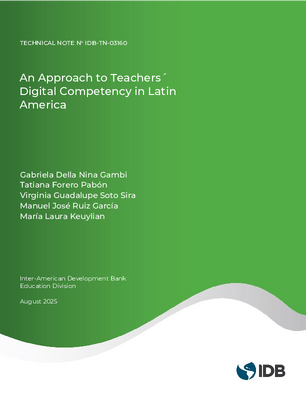An Approach to Teachers Digital Competency in Latin America
Date issued
Aug 2025
Subject
Teacher;
Digital Skill;
Digital Technology;
Professionalization;
Education;
Teacher Education;
Population Aging;
Digital Citizenship;
Learning;
Gender;
Digital Transformation;
Vocational and Technical Education
JEL code
I21 - Analysis of Education;
I28 - Government Policy;
J24 - Human Capital • Skills • Occupational Choice • Labor Productivity;
O33 - Technological Change: Choices and Consequences • Diffusion Processes
Country
Ecuador;
Mexico;
Colombia;
Honduras;
Panama;
Peru
Category
Technical Notes;
Co-Publications
In a context of accelerated digital transformation and a persistent learning crisis, this report presents a regional overview of how teachers in Latin America perceive their digital competencies. Based on a self-assessment completed by more than 28,000 educators across six countries, the analysis provides key evidence to inform teacher training strategies in the region.
The findings reveal that most teachers do not consider themselves to have reached a basic level of digital competence for teaching: only 27% report having basic skills in the pedagogical use of technology, 29% in digital citizenship, and 40% in professional development. The report also examines how individual characteristicssuch as age, gender, education level, technology training, and teaching areaare associated with self-reported digital competence. Younger teachers, men, those with postgraduate degrees, and those teaching STEM subjects tend to report higher levels of competence.
Finally, the report underscores the need for continuous, contextualized, and practice-oriented teacher training that fosters peer collaboration. It aims to contribute to an equitable and sustainable educational transformation by placing teachers at the center of pedagogical innovation and equipping them with the tools to prepare active citizens ready to navigate the challenges and opportunities of the digital world.
The findings reveal that most teachers do not consider themselves to have reached a basic level of digital competence for teaching: only 27% report having basic skills in the pedagogical use of technology, 29% in digital citizenship, and 40% in professional development. The report also examines how individual characteristicssuch as age, gender, education level, technology training, and teaching areaare associated with self-reported digital competence. Younger teachers, men, those with postgraduate degrees, and those teaching STEM subjects tend to report higher levels of competence.
Finally, the report underscores the need for continuous, contextualized, and practice-oriented teacher training that fosters peer collaboration. It aims to contribute to an equitable and sustainable educational transformation by placing teachers at the center of pedagogical innovation and equipping them with the tools to prepare active citizens ready to navigate the challenges and opportunities of the digital world.
NO


